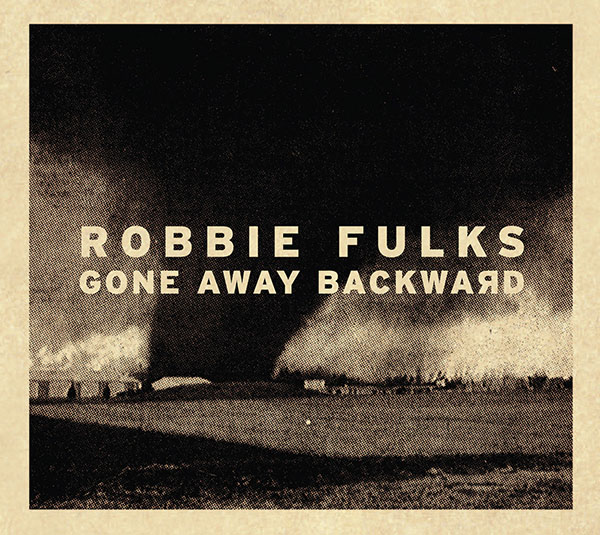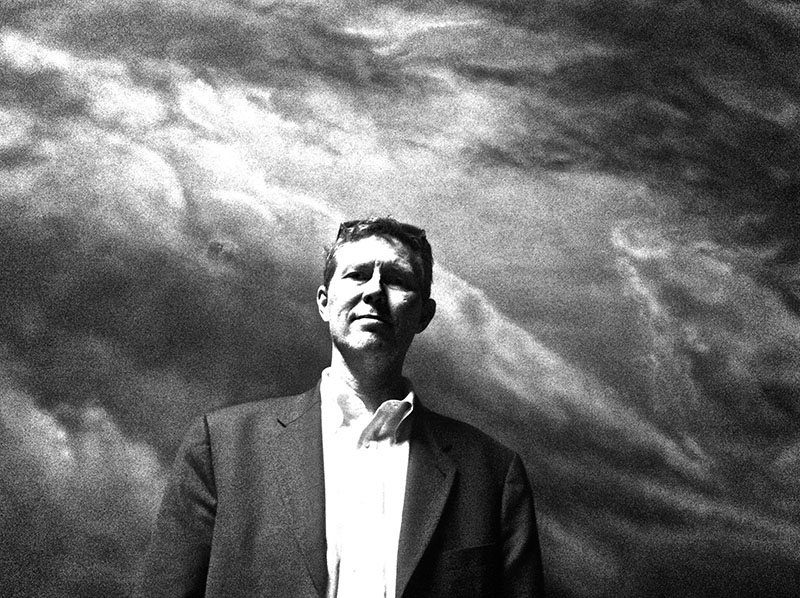
The Lowdown:
September 10, 2013
September 2013 Featured Review
Robbie Fulks: Gone Away Backward
by Jason D. 'Diesel' Hamad
The visual embodiment of the album, this picture gives life to the windblown feel that permeates the work, giving it a feel and mythos that could have come straight out of Bound for Glory. Photo by Dino Stamatopoulos.
Real musical surprises are too much a rarity these days. Maybe a new performer will catch the ear in a novel way, but generally speaking established artists don’t often reinvent themselves, and one can pretty much expect the same thing from album to album with only the smallest of changes gradually entering the mix. Not so with Chicago alt.country veteran Robbie Fulks, however, who’s latest release Gone Away Backward marks a stark departure from his previous work and constitutes a definite welcome surprise. Having looked forward to a new Fulks album for so long, this is the last thing I was expecting.
Fulks, a native of Pennsylvania who spent much of his childhood in North Carolina & Virginia and has always sported a definite Southern twist, gained a reputation starting in the mid-90s as a high-witted master of novelty songs à la Roger Miller, such as “Every Kind of Music But Country,” “She Took a Lot of Pills (And Died),” “I Told Her Lies,” and the ever-entertaining Nashville-basher “Fuck This Town,” as well as light but well-crafted love songs like “I Push Right Over” and “Tears Only Run One Way” and rocking barnburners like “Let’s Kill Saturday Night.” But these songs not only often belied the instrumental prowess he honed in his pre-solo bluegrass career, but also the deeper, more serious possibilities that obviously lay in potential within such a sharp wit. This changed with the release of his much-acclaimed masterpiece Georgia Hard in 2005. But even as that album included notably more serious songs like the semi-autobiographical title track “Georgia Hard” as well as “Where There’s a Road” and “Coldwater, Tennessee,” they were mixed in with novelty-type pieces like “I'm Gonna Take You Home (And Make You Like Me),” “Countrier Than Thou” and “Goodbye, Cruel Girl.” As unquestionably brilliant as these latter songs were, the former left a definite hunger for more heavier-toned pieces that until now has gone unsated.
Hunger no more with the release of Gone Away Backward, an exceptionally consistent and aptly titled collection that not only reunites Fulks with Bloodshot, the label with which he has had an on-again off-again relationship since the beginning of his career, but also takes his music back to his bluegrass roots and highlights the more serious side of his songwriting abilities. Stark and sepia-toned, the album finally constitutes a real continuation of the spirit of “Georgia Hard,” filled with migrant tales that would make Woody Guthrie proud, working class charachter studies that fall squarly in the Springsteen tradition, and down-home country and bluegrass sounds that alternately could have come from The Carter Family, Hank Williams, Bill Monroe or modern bluegrass sources like Sarah Jarosz.
In fact, two songs on Gone Away Backward in particular can rightly be said to be direct successors of “Georgia Hard,” each in their own way.
Perhaps the best song on the album is the spritely “Sometimes the Grass Is Really Greener.” Like “Georgia Hard” it’s the semi-autobiographical tale of a Southern boy moving to the big city. With a foot stomping beat, harmonies on the chorus, and full bluegrass accompaniment led by a hard-picked banjo, this one tells the story of a backwoods musician who leaves his mountain home in search of the spotlight, only to find himself longing to return as his music is compromised by industry hacks and he finds out his name on the marquee doesn’t mean everything:
For someone who usually lives on the lighter side of life, this album is a consistent turn toward the dark. Still, despite the more serious lyrical tone, several songs, such as “Sometimes the Grass Is Really Greener” maintain a brighter sound. Photo by Stan Golovchuk.
Well, now the record company man confessed he liked me,
Oh, but he’d have to shave some rough edges down.
Cut my hair like Brooks & Dunn’s,
Trade the banjo for some drums,
‘Cause no one would by that old high lonesome sound.
Now I don’t know just what this deal has got me
I gained not a fan and I lost the ones I had
I’ve worn my heart right through my sleeve
Singin’ a song I don’t believe.
I believe I’ll go home to mom and dad.
Now I’ve seen the sun go down
On the streets of New York town
And I’ve watched it from the hills of old Virginia.
Beauty’s what the heart beholds
One man’s dirt’s another’s gold
Oh, but sometimes the grass is really greener.
That song’s plot similarities to “Georgia Hard” can’t be denied, but its philosophical successor is “That’s Where I’m From,” a migrant’s tale taking its cues from Guthrie’s Okie dustbowl ballads or old Irish traditional Potato Famine laments like “Thousands Are Sailing to Amerikay.” It plods along wearily, as if a story told over a beer at the end of a long day’s work, in no great hurry to get from one line to the next. Like many such immigrants’ songs, it celebrates the bounties of the new life while pining for the simplicity of the old ways. While a geographic transition of Fulks’ character is implied, it’s his economic transformation that seems most important, as he lifts himself out of country poverty and into the citified middle class in an effort to make sure his own children don’t go through the travails of his own youth:
Two cars, a picket fence, that’s where I’ve come.
Dirt roads and doublewides, that’s where I’m from.
Night school on a fast track and no cause to look back.
That place put a scar on my soul.
And I swore my young ones would never know hunger
And a good life is all that they know.
Well I’ve watched them grow; now I see
One thing separates them from me
And that’s where I’m from,
Where time passes slower.
That’s where I’m from
Where it’s “yes ma’am” and “no, sir.”
You can’t tell I’m country, just you look closer,
It’s deep in my blood.
White collar, necktie, that’s where I’ve come.
Half naked in the moonshine, that’s where I’m from.
Another among the liveliest tracks on the album, “Long I Ride” is a foot tappin’ travelers’ tune with a down home feel, complete with a banjo-picked beat behind a bluegrass fiddle and Fulks’ backcountry yalp. The narrator, perhaps a stand-in for Fulks himself, is a travelling musician tramping from town to town just trying to get by, and the Guthriesque, road-weary Robbie captures quite well the vagabond philosophy found in many such individuals:
These New York folks’ll treat you kind
When your wallet’s in your hand
But a six-string on your shoulder
Could be the devil’s brand.
Well they’ll put themselves above you
But for all the strut and brag
I’d trade every brick on Wall Street
For one “Black Mountain Rag.”
It’s long to ride for the little I gain.
A road back to my boyhood
If I can only go.
There’s a little girl that stole my heart
And I think she’d like to know.
But the road goes only one way
And the only goal in sight
Is to make a bit more in the daytime
Than I drink down at night.
It’s long to ride for the little I gain.
On the other side of the spectrum both musically and thematically, the heartbreaker “Where I Fell” looks at life as a non-immigrant and is about a man who stayed put, making a life right where he landed when he found himself on this earth. It’s a story of the decline of the American small town, a story about the failings of the American economy, and the story of a regular guy just trying to get by through it all. Told against a slow, minimalist musical backdrop of lightly picked guitar with a little breathy whistling thrown in, it has a depressive, yet determined feel:
Daddy used to catch his supper in this river; now you can’t swim it.
Smells like a twenty-ton truck full of paint thinner sank down in it.
Come visit a spell; see the plaque to our war fallen.
Nothin’ but a good time.
Some guy in Bombay is runnin’ that press I used to hate.
Now I sling hash for what all spills off the interstate.
We sold the family store; left the building standing.
You can see the outline…
Where I fell might look like hell
From a jet airplane or the top of some big hotel.
I’d’ve chose a place more fine; the choice was never mine.
So I dwell where I fell.
The leadoff track, “I’ll Trade You Money For Wine” is a philosophical panhandler’s tune, one of several songs in the collection that focus on lower class members of society. With driving music opening with a twangy picked guitar but highlighted by a sawing fiddle, it’s bleak and foreboding like a gathering storm, setting the tone for the album to come. It seems a decade in one place gives one the opportunity for a lot of rumination, as the beggar narrator is chock full of Buddha-like koans of wisdom. Once prosperous, the down and outer gives glimpses into his life as he compares it to those he encounters:
I’ve seen your towns from a long black Lincoln, boys,
Back when copper was king.
Ten years I’ve stood on the same old corner, boys.
I never want for a thing.
Pockets of change don’t drive my worry down.
Diamonds don’t make me shine.
It’s a short life and a long time underground.
I’ll trade you money for wine.
Wild were the nights when I was rollin’, boy.
No hunger unsatisfied.
Feared was my name in Nelco County, boys.
Now they just walk on by.
The banker he spares a quarter for my cup.
His trouble’s deeper than mine.
That way of life, boys, there ain’t gold enough.
I’ll trade you money for wine.
A booze-soaked, semi-despondent breakup tale highlighted by great vocal harmonies, "When You Get to the Bottom" is a classic country tale that would have fit in just fine as part of Hank Williams' catalogue.
A sweet and sour broken heart anthem, “Guess I Got It Wrong” recounts the surrealistic, foggy brained moments just after the final goodbye in an imagery-heavy way that would rend just about anybody into a melancholy blob:

By breaking with the expectations of his earlier career but going back to tradition, Fulks has crafted an extremely interesting, wholly entertaining album that showcases both a musical ability and talent for crafting serious lyrical content that have sometimes seemed dormant. Photo by Stan Golovchuk.
Houston Tollway to I-10
Never looked this bleak before.
And why’s the feeling never strong as when
You can’t have her anymore?
Sad goodbyes, shattered dreams,
Darker skies I don’t think I’ve seen.
Hey, I thought love was just one sweet song.
Guess I got it wrong.
A piece that seems more fit for a smoky blues club than a hoedown and takes a somewhat jazzy, bass-centered turn is “Imogene,” a scant and often near-silent ode to the girl it’s named for and the narrator’s lazy courting thereof that crescendos both vocally and instrumentally in turn. Couched in biblical references and language, accelerating from a slow, sparse, soto voce, nearly spoken-word piece to a cacophonous clamor with words jostling for position to get out in line, and taking a turn for the completely out there, “The Many Disguises of God” constitutes one of the stranger conversations ever had by a father speaking to a newborn child. Sounding just like it could have come from the Carter Family’s Clinch Mountain home, the closer “Rose of the Summer” tells the tale of a young man torn from his love by war, but never forgetting the summer shared together even as they live out the entire rest of their lives separated not by space, but by circumstance, and with no hope to rekindle the fleeting romance.
Two instrumentals round out the compliment. “Snake Chapman’s Tune” is a somewhat progressive bluegrass piece that stands up with the best of ‘em and feels like it could have come off of a Sarah Jarosz album. Rocketing at a “look how fast I can pick!” pace and not even reaching two minutes, “Pacific Slope” is purely a showcase for the players, a role in which it excels as it amply displays the talents of all involved.
It’s hard to pick out a song on Gone Away Backward that stands out well above the rest, but it’s a consistently good album without a single track that’s unworthy of frequent play. And what it lacks in the way of the rock power or comedy stylings of Fulks’ earlier works, it more than makes up for in bluegrass musicianship and well-crafted, often philosophical pieces. Fulks’ choice to return to his roots will obviously pay dividends and no matter your familiarity with his earlier career, Gone Away Backward is a terrific album to add to your collection of hillbilly giants.
| mp3 | cd | vinyl |
|---|---|---|








Follow @NoSurfMusic